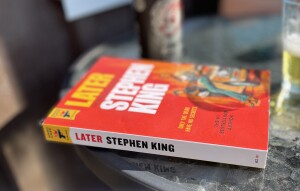“You tote your own burden in life”
 Later is the third King novel published under the Hard Case Crime imprint. Like Joyland, it’s written in the first person by someone trying to make sense of something that happened. This one, however, is set in the modern era, with smartphones and all.
Later is the third King novel published under the Hard Case Crime imprint. Like Joyland, it’s written in the first person by someone trying to make sense of something that happened. This one, however, is set in the modern era, with smartphones and all.
As a kid raised by a single mother, Jamie Conklin discovers he can communicate with the dead. The ghosts usually move on in a little while, after becoming inaudible. He is told by his mother in no uncertain terms to hide his ability, which is presented in a mildly comical scene involving their deceased neighbour.
“They have to tell you the truth when they’re dead. I didn’t know that at the age of six; I just assumed all grownups told the truth, living or dead.”
Mrs Conklin is a literary agent fond of four letter words and wine. In the stock market crash of 2008, she loses most of her money. But when the writer of a series of books about the Roanoke settlement that have so far ensured them a steady income suddenly dies, Jamie’s desperate mother has an idea …
Yes, it’s partly another King book about writers. And yes, he has found another fresh angle. And the Roanoke settlement is an interesting topic worthy of a series of historic novels. It’s also funny, sympathetic and genuinely entertaining. At least at first. The roster of characters include a police officer named Liz who happens to be his mother’s lover. She gets wind of his gift and he tries to explain, not knowing what kind of person she will turn into.
“You get used to marvellous things. (…) There’s too much wonder, that’s all. It’s everywhere.”
There is terror here as well, though. A serial bomber named ‘Thumper’ is maiming and killing people at random and, desperate for a break, Liz thinks his ability may be useful here. But meeting a dead murderer is much worse than the ‘normal’ ones. And what if they don’t fade away? What if they hate you and decide to hang around, perhaps even making dark but deceitful prophecies?
So yes, it’s a horror story. A very Kingish one with little embedded flashes of wisdom and a main character with integrity. At 260 pages a short one, as King novels go , but with room for a reference to IT (‘the ritual of Chüd’), a terrible possibility and a dramatic final stretch involving Liz, a drug dealer and his opulent villa.
And perhaps many readers foresee the final twist. I must confess I did not. It’s a pretty bold one, and still quite low key. As Jamie puts it, it seems “laughably unimportant” compared to the ominous shadow looming over the epilogue. Ominous but not hopeless.
Later is eerie and thrilling but not profoundly disturbing. It’s also comfortably familiar, as King as it gets. He even quotes himself:
“Books are a uniquely portable magic.”
